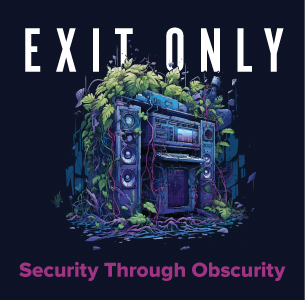
::..:::…..:..::….:::::..:::..:::::::……:::…::.:::….::::..:..:::…::…….::::
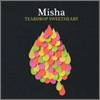 Chicago film critic Roger Ebert has said, although I don’t have the
Chicago film critic Roger Ebert has said, although I don’t have the
reference handy, that he rates films based on whether or not they
achieve what he perceives their aim to be. If a film aims to be an
over-the-top, blow-stuff-up, kill-bad-guys thriller and there is
unnecessary, wanton destruction until the villain gets his
comeuppance, Ebert seems to rate it higher than a cheesy action film
that has pretenses to the art-house. He also, famously, rated films on
his television show with a thumbs-up or -down. I’m going to use the
same system for Misha, the New York-based duo of Ashley Yao and John
Chao, whose album, Teardrop Sweetheart, feels overlong even at a
relatively brief 39 minutes, perhaps due to its complete lack of both
a memorable hook and sense of conviction in both composition and vocal
delivery. Granted, Misha’s songs are brittle, fragile constructs,
updating the lounge sounds of The High Llamas covering a St. Etienne
ballad. And while that combination sounds promising, Sarah Cracknell
and Sean O’Hagen never dropped stillborn lyrics like on “Anaconda:”
“Anaconda, sittin’ in her Honda, feeding in the parking lot. I had a
heart, but she flayed me and took me apart.” Um, second grade called,
it would like its poetry back. Musically, Teardrop.. is very same-y from
track to track: Casio keyboards, gentle guitar, electronic beats, and
damn near the same bpm every time. It seems like Misha are trying to
take the classic Burt Bacharach/Hal David pop-songwriting school and
tug it into 2007, but where Burt and Hal could make lemonade out of
salt, Misha make an empty margarita glass, and the bar is closing. Did
Misha achieve their aim? Not in anything resembling a compelling way.
For a pop album created in the bedroom, Teardrop.. sounds under-produced
and under-performed. And in the cruelest irony, the final track,
“Trying,” ends with John Chao singing over and over “I’m still trying
too hard.” Irony is such a cruel mistress, even when applied
intentionally. [Purchase]
::..:::…..:..::….:::::..:::..:::::::……:::…::.:::….::::..:..:::…::…….::::
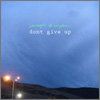 I’m not the person to review this. See, I don’t really like hip-hop. I
I’m not the person to review this. See, I don’t really like hip-hop. I
try. There’s a couple Public Enemy tracks I really like. I like Dalek
in small doses. Maybe some early Wu-Tang. But that’s about it. I think
a lot of potentially cool d’n’b tracks from the early- to mid-90s were
ruined by rapping. I saw 808 State in 1994 or ’95, and they had an MC
that was so awful I walked out after 10 minutes. Who, in 1995, wanted
to hear anyone rap over the brilliance of “Cubik”? If you answered
“me,” then I don’t want to know you, because you are so far away from
my musical sensibilities that we would have nothing to discuss, but a
lot to argue about. Personally, a lot of music being made now is being
ruined by narcoleptic, solipsistic MCs, and Don’t Give Up is a fine
example. But let me further qualify, before I go further, that hip-hop
is not my thing at all. Doesn’t pump my nads, doesn’t instill a sense
of amazement through deft wordsmithing, and is second on my list of
musical genres from which I derive little to no pleasure, right after
country. Current evidence on the table is the latest collaboration
from Serengeti & Polyphonic the Verbose. And this isn’t going to
change my opinion too drastically. Tracks where the texture overtakes
the vocals, as on the mid-eastern glitch environment of “Praha” catch
my ear, but each avant-garde moment like the pitch-shifted screams of
that track, is countered by the generic flow of tepid wordplay as on
“2 Times 2.” The idea of a solo album from Polyphic (who, despite the
rest of his name, is responsible for the music on this album) is
exciting – hell, a karaoke version of this record excites me, for most
of the music on this album is placed second to the lackluster lyrics
and vocal stylee of Serengeti. There are some exceptions, and these
exceptions take this collaboration into the neighborhood that Dalek
inhabits, but for the most part, despite its tiptoes into the
avant-garde, Don’t Give Up is nothing for me to get too excited about.
But hip-hop isn’t my thing at all.
::..:::…..:..::….:::::..:::..:::::::……:::…::.:::….::::..:..:::…::…….::::
 I have been putting writing this review off for a very long time, for
I have been putting writing this review off for a very long time, for
the simple reason that I have not been able to artfully state my
opinion without falling to ad hominem attacks. Perhaps it is fate that
this album has come to me, and that, via some Richard Kelly-derived
wormhole, my opinion of this stinker of a record may save lives.
That’s my hope. Because I really really do not like this record. This
record seems to have been made with the desire that no one like it.
And where deliberately provocative electronic records have been made
for years (see Suicide, Throbbing Gristle, and Whitehouse), the best
of those records have failed at being unenjoyable, as there is a
fan-base for each of those bands, and rabid fan-bases at that. So
perhaps Retconned has finally achieved where others have failed and
created an album that has absolutely nothing to recommend it, one that
provides no pleasure, provokes nothing besides an urge to turn it off
and stifles the intellectual curiosity that would keep playing it
after everyone has not only left the room where this is playing,
they’ve left the party. Musically, Unhappenings sounds like
fourth-graders trying to remake the first Suicide record, with the
schoolyard bully sneering, in the most dated Billy Idol sneer
imaginable, ridiculously banal lyrics, things that Ogre would have
written in sixth grade and then burned out of shame. I hope my point
is getting through, but if it isn’t, here’s the bottom line:
Unhappenings = no good for anything except clearing a room so
thoroughly that you leave it too. [Purchase]
::..:::…..:..::….:::::..:::..:::::::……:::…::.:::….::::..:..:::…::…….::::
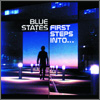 Siding with the progressive states with their name, Blue States (aka
Siding with the progressive states with their name, Blue States (aka
Andy Dragazis, producer for The Pipettes) eschew a progressive feel in
their music, but still evoke a sense of future possibilities with
First Steps Into, but into what? Sounding at times like Vangelis,
late-80s Tangerine Dream, and a college-town funk band, Blue States
serves up a platter of tasty treats for the feet. Mixing live drums
with strings and electronics is hardly innovative, but here they sound
fresh, or at least, pivotally alive. Stilted this is not. “The
Electric Compliment,” which buoys the album’s first half as track
number four, expertly moves from a sub-Sigur Ros string-laden piece to
a jaunty piano-led piece with happy handclaps, enough to put a smile
on your face and give the feet a good excuse to jump around. It’s not
high art, but what is anymore these days? This is a fine little
platter for when you just want to bob your head or move your feet to a
gentle yet insistent beat. [Purchase]
::..:::…..:..::….:::::..:::..:::::::……:::…::.:::….::::..:..:::…::…….::::
 This collection aims to spotlight a series of California producers,
This collection aims to spotlight a series of California producers,
each with something a little differ to offer than the other, but as a
whole, that come out sounding like most other “crew comps” out there.
Meaning, that there are some excellent tracks, but there is some dead
weight as well. The comp opens with Reed Rothchild, aka Jess Stroup,
whose track, “Mid-Air” wouldn’t sound out of place on a Royksopp
album. Settling in for some down-tempo trip-hop, Surface 10 is next,
featuring the heart-tugging violin of Laura Escude, who gets her own
track next. “Noncommital,” easily the most exciting track on the disc,
with Escude working solo, her violin really nailing an emotional high
over crunchy idm-beats and some laptop synth. Really really super nice
track. My understanding is that she makes her living from doing
commercial spots in the auto industry, and sundry other commercial
work. Laura, if you’re reading this, please take a hiatus and do a
full-length album. Further in, Sequenox drop “Ice Field,” a track best
described as Boards of Canada in winter, fully capturing the BOC sense
of innocence in a slinky downtempo groove. Other highlights on this
comp include R_Garcia’s “ATL Stompin’,” which brings a little bit of
that early ’90s-acid feel back, and freshens it up with some
surprisingly enjoyable 8-bit fx. Late into the disc, Constant Flux
drops the great missing braindance track, “Digital Donkey” which
should totally be a white-label 12″ from Rephlex. People would go nuts
over this track like they did for Astrobotnia before it was revealed
to be Ovuca. On the downside, there’s some less than stellar material
here, notably the umpteenth sampling of Timothy Leary by Tripform on
“Multiple Realities.” Can we all just agree that for a little while,
no one is going to sample Leary? It was never innovative or daring,
and his damaged ramblings have ruined more lives than they’ve saved.
So let’s just let him rest in piece, ok? Agreed? Thanks. Vic
Hennegan’s “Linger” has some potential to be a great one, but the
sub-Goldfrapp diva wailing from guest vocalist “Becca Fuchs” make the
track sound like something off the terrible final Orbital album. And
Cavestar apparently believes there’s still some life in the
isolationist ambient genre. He’s wrong, but here he tries to unsettle
with “Fod,” an amalgamation of watered-down Lustmord and Paul Schutze.
Blah. So, to sum up. Ultimately, Undergrounded is 1/3 good, 1/3 not
bad, and 1/3 bad. But when you’re batting .333, you’re doing ok. And
like most comps these days, you can cherry-pick the best tracks from
Itunes.
::..:::…..:..::….:::::..:::..:::::::……:::…::.:::….::::..:..:::…::…….::::
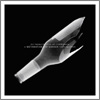 Aaah, finally. All of your favourite Lee Norris tracks in once place.
Aaah, finally. All of your favourite Lee Norris tracks in once place.
My Favourite Kind of Irreverence contains tracks from all stages of
Norris’ career (especially if you can get your hands on the 2 CD
version, which contains a ton of his ambient work under the Nacht
Plank alias, along with other more ambient tracks under Metamatics and
Tone Language). The ingenious cover of “Personal Jesus” starts things
out and mixes effortlessly into my personal favourite Metamatics
track, “Here To Go (Days Are Gone)” which appears here in a rare
7-inch mix. And from there its all gravy, with Norken’s blippy
dance-bient “Southern Soul” and then the gonzo collaboration with
Ultravox’s John Foxx on “Free Robot,” a tasty Metamatics remix of A1
People’s “Do It” and another 45 minutes of some beautiful blissful
techno. There isn’t a bum track here, not a one. And what really makes
this compilation special is that the sound of this music, the vibe,
the juice, it just doesn’t exist in what’s coming out these days. I
don’t want to get all “it was better back in the day” but Irreverence..
just hammers home a point I’ve been trying to make for a long time,
that while there is far more music being made today than there was
even several years ago, very very little of it has that tangible magic
that makes it special. Norris has it in spades. [b>]
::..:::…..:..::….:::::..:::..:::::::……:::…::.:::….::::..:..:::…::…….::::
 Supersilent emerge from a five-year studio-album hiatus to engage the
Supersilent emerge from a five-year studio-album hiatus to engage the
world as a lumbering beast, Cthulhu risen from the depths of R’lyeh to
lay complete waste to the world. For 8 is mean and nasty, an angry
punch to the chest, a complete change from the late-Miles fusion
sounds of 5 or 6. Impossible to describe by track, 8 covers a lot of
sonic territory, sludge-metal (sans guitars), music-concrete,
Krautrock (sort-of), modern classical, and a form of jazz that hasn’t
really been explored much yet outside of this group. Supersilent’s
music is very intuitive, its members only ever getting together to
improvise together, never to discuss their music together, only play
it. And in the 10 years they’ve been together, they’ve progressed from
hardcore-jazz freakouts like on 1-3, near-ambient on 6, to this unique
amalgam of so many disparate genres. Recorded over five days, 8 was
pared down from five hours of music by long-time producer and member
Deathprod, and I’m guessing that the tape-splicing of Teo Macero was a
big influence here. Much like Bitches Brew or On the Corner, Macero’s
splicing of longer jams resulting in some seminal jazz pieces that
sound like they were in some way composed, or at least scripted out.
Same thing here. This group continues to amaze in every way. Also, one
caveat – there is a LOT of low-end on this record. Not enough to
damage speakers, but make sure you have something with a decent bass
response on it to get the full effect. [Purchase]
::..:::…..:..::….:::::..:::..:::::::……:::…::.:::….::::..:..:::…::…….::::
 Good old Sasu Ripatti, as dependable as anything, thankfully prolific
Good old Sasu Ripatti, as dependable as anything, thankfully prolific
under a number of aliases. Here he dusts off Uusitalo, not seen since
2006’s Tulenkantaja, Bearing marked similarities with that record,
Karhunainen still evokes the icy atmospheres of Finland, its minimal
grooves pulsing with danceably insistent basslines in the classic
Ripatti style. If you’ve heard previous Uusitalo albums, you know what
to expect here. The album as a whole does not represent an innovation
in the Uusitalo sound, but further refines it, honing its chilly
atmospheres in smaller chunks (see older Delay material for
longer-form versions), wielding the studio as a surgical scalpel,
maxing out the dub effects in all manner of compelling ways. Its hard
to guess where Uusitalo can go from here, as this seems like the end
of the road for this style. Luomo has hit a dead-end, Sistol is dead
in the water. Delay’s Whistleblower was a breath of fresh air, and
this is as well, don’t get me wrong, but there really isn’t much
further that this project can be taken without betraying its roots and
going handbag or something gonzo like that. And maybe that’s what
should happen – just completely mix things up, say WTF, and drop a
record under this alias that sounds like U96. Someone would probably
call it innovative. But not this reviewer. As much as I like this
record, and I do really like it, it is starting to sound like more of
the same, and that I can’t truck with for too long. [Purchase]
::..:::…..:..::….:::::..:::..:::::::……:::…::.:::….::::..:..:::…::…….::::
 I don’t know. I’m just not getting what is so special about the
I don’t know. I’m just not getting what is so special about the
Anticon collective. Granted, hip-hop is not my thing (see Serengeti &
Polyphonic review above), and instrumental hip-hop even less so. I
remember getting burned on the Dr. Octagon instrumental album back in
like ’97, finding its supposedly innovative beats soporific,
narcissistic, and ultimately useless. 10 years on, I’m reminded of
that record by this one, another vain and futile attempt at mixing
hip-hop beats with electronic atmospheres, So Telephone Jim Jesus
(what’s this name supposed to mean, anyway?) tries and fails at making
compelling music, or music that demands replaying, but at least he
tried and in that attempt lies redemption. Adding more music to the
landscape of electronic music lowers its signal-to-noise ratio, but
there’s always that chance, a one-in-a-thousand chance that a producer
will hit the right buttons, program the right beats, sequence the best
melody, and nail it, even if for one track. Jim Jesus comes close on a
couple, “Featherfall,” opener “Did You Hear?,” but misses the mark
more often. And hey, that’s fine, at least he tried, which is more
than I can say for myself. [Purchase]
::..:::…..:..::….:::::..:::..:::::::……:::…::.:::….::::..:..:::…::…….::::












